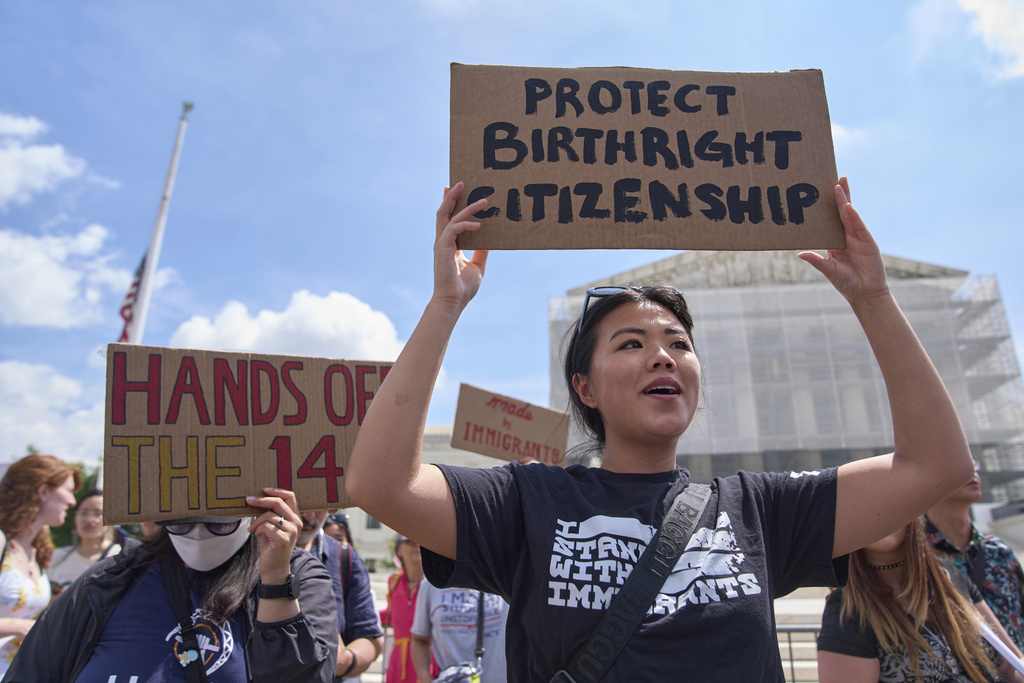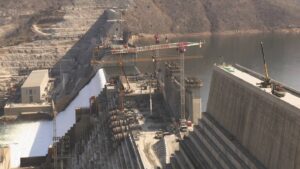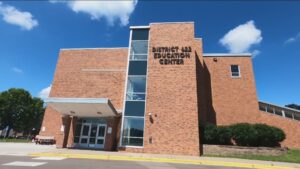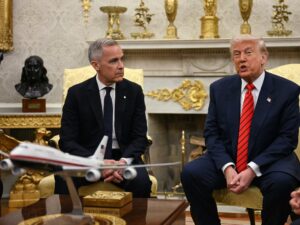
Hannah Liu, 26, of Washington, holds up a sign in support of birthright citizenship, Thursday, May 15, 2025, outside of the Supreme Court in Washington. "This is enshrined in the Constitution. My parents are Chinese immigrants," says Liu. "They came here on temporary visas so I derive my citizenship through birthright." (AP Photo/Jacquelyn Martin)
Updated at 12:33 p.m. on Friday, June 27, 2025.
The state of Colorado will continue to uphold birthright citizenship, despite a recent Supreme Court ruling that could allow President Donald Trump to temporarily end the practice in other states. Colorado Attorney General Phil Weiser assured residents that birthright citizenship remains protected in the state, even as the nation grapples with the implications of the court’s decision.
“You’re protected. And if people are born here in Colorado, they still will benefit from birthright citizenship,” Weiser stated during an interview with Colorado Matters. The Supreme Court’s 6-3 decision, delivered by Justice Amy Coney Barrett, may enable the Trump administration to implement its order to end birthright citizenship in much of the country, but not in Colorado and certain other states, for children born after February 19.
Legal and Political Ramifications
Legal experts have emphasized that the issue of birthright citizenship is far from resolved and is likely to return to the Supreme Court in the future. According to Lunn, director of advocacy and litigation at the Rocky Mountain Immigrant Advocacy Network, the Supreme Court did not address the constitutionality of Trump’s order, as it was not presented to the court by the government.
Meanwhile, the ruling may expedite the administration’s efforts to implement other controversial policies, such as defunding “sanctuary” cities like Denver. President Trump expressed satisfaction with the ruling, stating it would allow his administration to advance policies previously blocked by lower courts.
What the Court Ruled
The Supreme Court’s decision did not address the constitutionality of Trump’s order to end birthright citizenship, which grants citizenship to every child born in the U.S., regardless of their parents’ immigration status. Instead, the ruling focused on the legal process, determining that lower-court judges overstepped their authority by issuing nationwide injunctions against the order. The decision allows Trump’s order to take effect in many parts of the U.S., although it remains blocked in Colorado due to the state’s lawsuit against the order.
“When a court concludes that the Executive Branch has acted unlawfully, the answer is not for the court to exceed its power,” the majority wrote.
Implications for Colorado and Beyond
The ruling has significant implications, not only for the citizenship case but also for other legal battles. The court’s majority framed the decision as a means to restrain judges from exceeding their authority. Trump celebrated the ruling, calling it a “monumental victory” for the Constitution and the separation of powers.
Attorney General Weiser warned of potential chaos if Trump’s order is implemented, creating discrepancies in citizenship rights across states. “If someone’s born in Colorado but lives in Wyoming, are they a birthright citizen or not?” Weiser questioned, highlighting the complexity and uncertainty the ruling introduces.
The ruling could affect neighboring states such as Wyoming, Nebraska, Kansas, Oklahoma, and Utah, along with 23 others nationwide. Even if the order is eventually overturned, the legal battle could take months, leaving immigrant parents in a state of uncertainty.
Reactions from Political Figures
Justice Sonia Sotomayor, in her dissent, described the ruling as a “grave attack on our system of law.” Colorado Democrat Rep. Joe Neguse called the ruling “misguided and reckless,” while Republican Rep. Gabe Evans expressed support for the decision, focusing on limiting the authority of district court judges.
Governor Jared Polis criticized the ruling, warning it could erode constitutional rights and create a patchwork of legal protections across states. “This is a sad day,” Polis stated, emphasizing the potential weakening of well-established rights.
Historical Context and Future Prospects
The debate over birthright citizenship is deeply rooted in American history. The 14th Amendment, enacted in 1868, declares that all persons born or naturalized in the United States are citizens. This principle, known as jus soli, was reinforced by the 1898 Supreme Court ruling in United States v. Wong Kim Ark, which affirmed citizenship for a child born to Chinese nationals in the U.S.
Anti-immigration advocates argue that birthright citizenship encourages illegal immigration and “birth tourism.” Trump has argued that the 14th Amendment was intended for the descendants of slaves, not for those seeking to exploit the system.
Local immigration attorney Cristina Uribe Reyes criticized the decision, questioning the executive branch’s power to alter constitutional interpretations. Immigrant rights advocate Jennifer Piper highlighted the broader implications of the case, viewing it as an attempt by the president to consolidate authority without congressional approval.
Continuing the Legal Fight
Attorney General Weiser vowed to continue challenging Trump’s order, emphasizing the importance of the 14th Amendment and longstanding legal precedents. “Within the next month, we’ll be back in the district court,” Weiser affirmed.
The Supreme Court may ultimately decide whether Trump has the authority to revoke birthright citizenship. The outcome could impact hundreds of thousands of children born each year in the U.S., as multiple lawsuits challenge Trump’s reinterpretation of the 14th Amendment.
The ongoing legal battle underscores the complexities of immigration policy and the enduring significance of the 14th Amendment. As the nation awaits further developments, the debate over birthright citizenship remains a pivotal issue in the broader discourse on immigration and constitutional rights.
This story is part of a collection tracking the impacts of President Donald Trump’s second administration on the lives of everyday Coloradans. Since taking office, Trump has overhauled nearly every aspect of the federal government; journalists from CPR News, KRCC, and Denverite are staying on top of what that means for you. Read more here.





